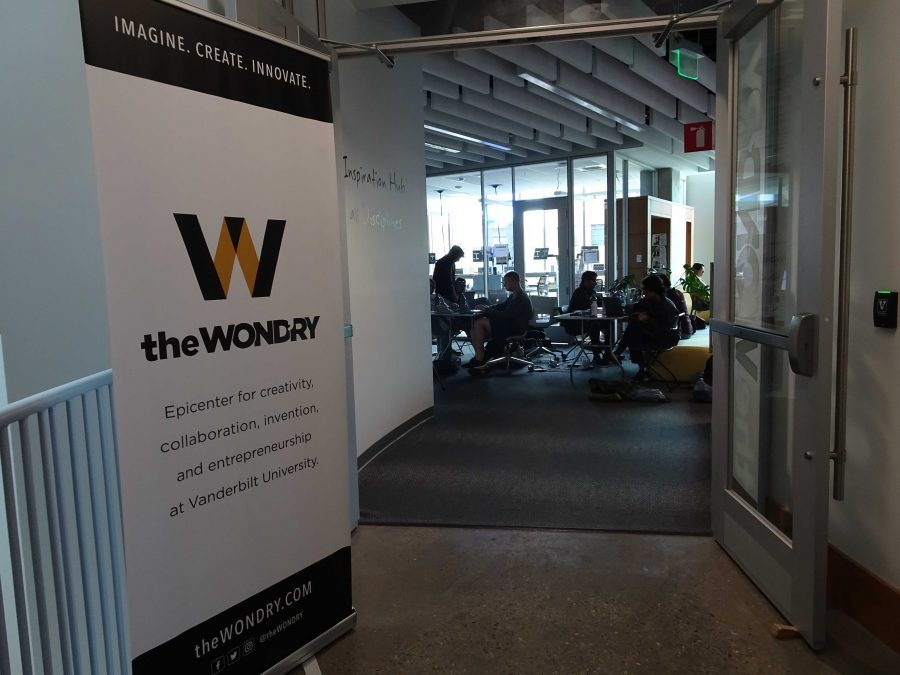Last Friday, students from around the country trickled into the Wondr’y for the fourth annual VandyHacks hack-a-thon. A three day event, VandyHacks is 36 straight hours of intensive project-building in the name of technology, entrepreneurship and prizes.

The city of Nashville’s Chief Data Officer, Robyn Mace, opened the event as the keynote speaker and commenced the weekend sprint toward innovation. Students, who arrived in pre-formed teams, began hacking immediately. Other hackers travelled alone, looking to find other creatives minds at the event. Amber Blue and Zachary Stovall, the creators of a dashboard showing state-specific Twitter trends called Genzai, live in different states and never met before this weekend.
“We met each other at one of the pitch session for students who didn’t have a group. We felt that we had the same goals, same vision, “ said Stovall.
VandyHacks actively encourages solo hackers, who may be reluctant to attend, by hosting a pitch session helping individuals form teams.
VandyHacks is designed for hackers of all skill levels, giving an extra helping hand to true beginners. Beginner workshops, hosted by student speakers, included three tracks on android development, unity development and web development. These workshops were made for novices with zero coding experience. Co-president of VandyHacks, Connor Goggans, explained the ultimate goal of organizing the event.
“We try to focus more on the learning aspect than on the competitive aspect. We care more that people have a good experience and come out knowing something more than before,” said Goggans.
 The Hack-a-thon standard is to eliminate financial barriers and provide equal opportunity regardless of economic background. Travelling hackers came from far and wide, most notably Georgia Tech, University of Florida, Purdue University, University of Illinois at Urbana-Champaign and more. Transportation, food and a wellness night that promotes self-care through yoga and manicures were included free of cost at the event.
The Hack-a-thon standard is to eliminate financial barriers and provide equal opportunity regardless of economic background. Travelling hackers came from far and wide, most notably Georgia Tech, University of Florida, Purdue University, University of Illinois at Urbana-Champaign and more. Transportation, food and a wellness night that promotes self-care through yoga and manicures were included free of cost at the event.
In the front atrium, to the side, is a section labeled for mentors. At any time, curious students could seek hands-on help from tech and business professionals ranging from Facebook engineers to local Nashville entrepreneurs.
Event sponsors lined up the right side of the lobby, promoting their brand and offering free swag. Sponsors, such as MicroStrategy, BNY Mellon, Capital One and The Home Depot also seek talent at these events, providing on-site interviews to qualified candidates. The hiring process is expedited for both parties, and job seekers have the opportunity for a more personalized touch than in a typically faceless virtual interaction.
“That’s what makes the hack-a-thon,” said Joey Vineyard, a hacker from Purdue University. “A hack-a-thon isn’t just building projects and winning prizes. It’s getting to meet all the sponsors, making new connections and learning new things.“
Despite the mentors, workshops and networking, VandyHacks is ultimately a contest. Projects were evaluated based on technical difficulty, presentation, efficacy and originality. First round judges included a general pool of mentors and event organizers who cull six finalists from over 75 projects. Final round judges, including keynote speaker Robyn Mace, Doorport startup CEO Ben Taylor, and MicroStrategy Senior Product Manager Sam Gerry, then stepped in to determine the top three winners.
The big winner of the weekend was Guardyn, an alert system that detects active shooters in terrorist situations and reports the assailants appearance, weapon type and location. AmblyoCare, a VR first person shooter game that doubles as treatment for lazy eye patients, won second place. And CongressSect, an app that allows voters to learn about their state elected officials and discuss the viability of proposed bills with other users, took home third place.

In the jovial spirit of VandyHacks, sponsors and judges presented superlative awards to some of the most notable projects. BorkedIn, a LinkedIn page for dogs, won Most Fun Hack. WeLocate, an app that suggests the optimal location to open a small business, won Most Disruptive Hack and Best Financial Hack. And QuentiPi, an interactive math game with Amazon Alexa that helps users learn the digits of pi, won Best Beginner Hack.
Although the event was a major success, VandyHacks doesn’t suddenly retire until next year’s hack-a-thon. Co-president Irfaan Khalid sees VandyHacks as more than just a singular event on one weekend of the year, but rather a continuous platform to support a cohesive tech community.
“I don’t think VandyHacks ends with the Hack-a-thon,” said Khalid. “We’re trying to foster a thriving community of technology. So we have regular hack nights throughout the semester, which are mini hack-a-thons. We do study nights. We try to make sure that people are constantly engaged.”
 VandyHacks seeks to fill the gap between the academic and practical poles of the computer science major at Vanderbilt.
VandyHacks seeks to fill the gap between the academic and practical poles of the computer science major at Vanderbilt.
“CS classes are not entirely reflective of the industry,” said Goggans. “The CS major only requires one project-based course, and all work needs to be your own. But in the working world, you team up with eight to nine people and need to collaborate on real problems. You don’t really get to learn that very well in classes here. But in a hack-a-thon, on teams of three to four people, you really learn to work with others.”

